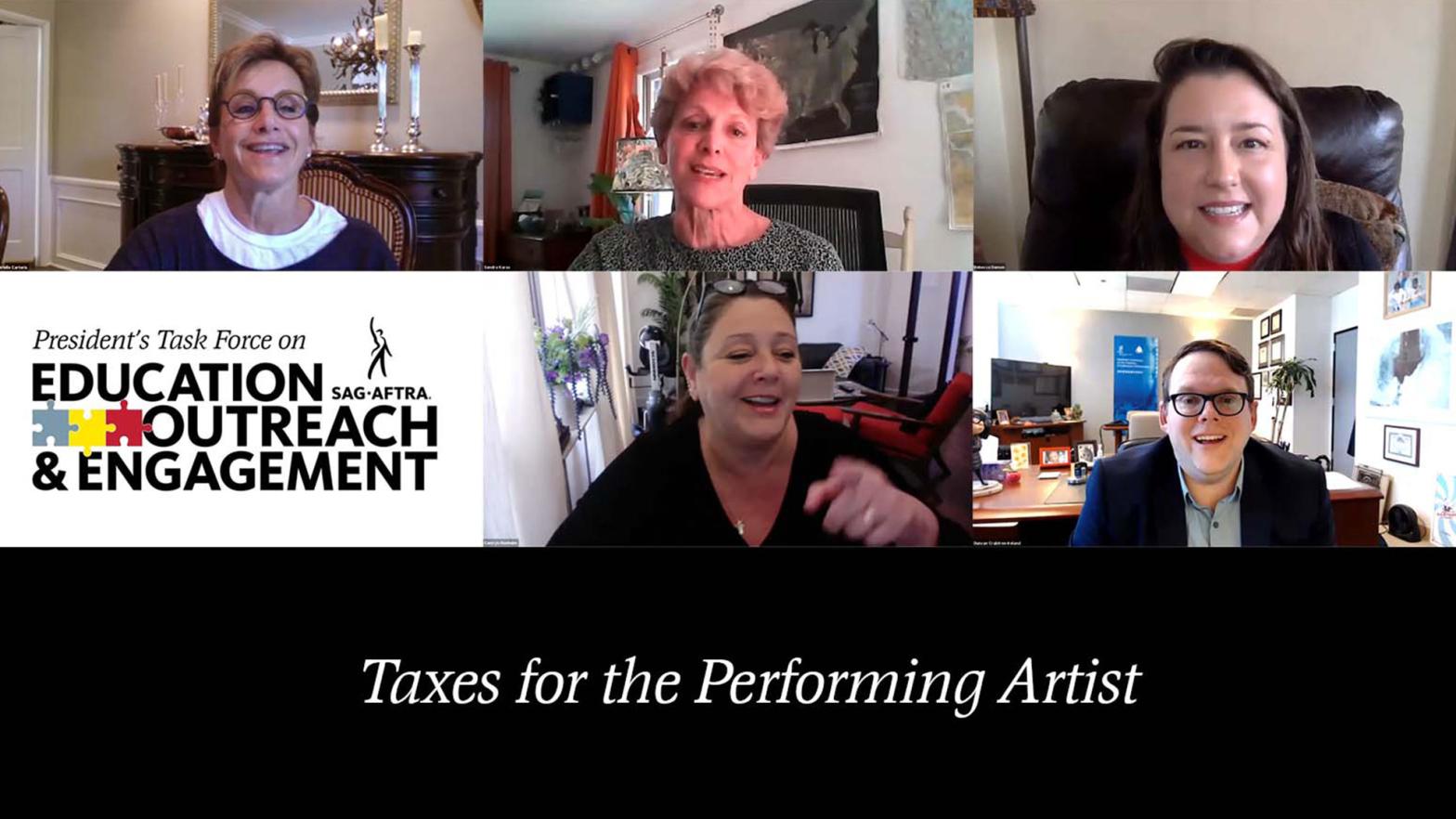
In April, the Internal Revenue Service announced July 15 as the new deadline for submitting your 2019 taxes and Oct. 15 as the final deadline for those filing an extension. The new date allows those experiencing issues in submitting their taxes more time to file.
To provide helpful information about this development, the SAG-AFTRA President’s Task Force on Education, Outreach & Engagement hosted Taxes for the Performing Artist on May 5. The livestream was led by member, tax attorney and accountant Sandra Karas, with President Gabrielle Carteris and Executive Vice President and New York Local President Rebecca Damon as co-hosts, and Chief Operations Officer and General Counsel Duncan Crabtree-Ireland as moderator. Watch the video below.
In addition to her stage, film, television and legal work, Karas is also the director and chair of the Volunteer Income Tax Assistance (VITA) program in New York, which offers tax services to members of SAG-AFTRA and Actors’ Equity Association. VITA regularly provides insight and aid to performers about the filing process. With the extension and other provisions provided by the Coronavirus Aid, Relief and Economic Security (CARES) Act, Karas discussed details filers should keep in mind as well as other tools and information that can help performers submit their information more accurately.
Whether familiar with the process, seeking to take advantage of the extension or filing for more than one year, here are some things to keep in mind:
Your tax information determines whether you will receive economic relief.
Under the CARES Act, many U.S. residents have, or will receive, an Economic Recovery Act payment, or stimulus check. For some, that amount could be $1,200, while married couples may receive $2,400 (with an additional $500 for dependents). Karas pointed out that an important factor in individuals or households receiving these respective payments is whether or not the government has received updated, accurate income tax information, if you are required to file returns.
“If you are required to file taxes and your return is not on file, you will not be considered for a stimulus paycheck,” said Karas. “So make sure you get your [2018 taxes] on file, and your 2019 taxes if you can.”
Even beyond the CARES Act, Karas noted that filing your taxes is a good idea to ensure overall financial health and that tax information is beneficial to have for other financial situations you may later face, such as qualifying for renting or housing, or applying for scholarships.
For those who may not have to file, Karas suggested inquiring with the IRS to see if they would be eligible for stimulus payments.
The extension provides an opportunity to make necessary corrections to your tax returns.
With the different types of roles a performer lands within a year, sometimes it’s difficult to remember all your earnings and expenses, even in the best of times. While the government has always allowed filers to resubmit their information to reflect any changes, such as a change in dependents, the extension does help lessen worries that may arise from having to do so.
If you still cannot file by July 15, you may submit an extension of time to file (Form 4868) to take advantage of the October 15 extension deadline.
The CARES Act has set new relief provisions for retirees.
Karas pointed out that The CARES Act provides members easier access to their retirement funds. Those provisions include penalty-free distributions from retirement accounts, loan amount increases from qualified plans and the suspension of required minimum distributions.
The reason for these benefits is simple: to help those using their retirement funds to either retain or regain financial health during the pandemic.
“A lot of [retirement accounts] are gaining most of their value back and we hope that that continues to improve over the next few months or maybe a year or two,” said Karas.
Though Karas provided many helpful tips, it is still advisable to consult with a tax preparer about submitting your information. With stay-at-home orders still in place in many states and less accessibility to in-person appointments with a professional, Karas recommends filing online through the IRS for free through the IRS Free File program. Visit irs.gov for helpful FAQs and other materials.
Watch the livestream below, and be sure to review some of Karas’ other helpful tips and access worksheets that can aid with organizing your expenses and deductions:
- VITA 2019 Income Information Checklist
- VITA 2019 Performing Arts Expenses
- VITA 2019 Out of Town Expenses
- VITA 2019 Auto Expenses
The information provided through the workshop is given for informational purposes and is not a suitable substitute for the advice of a tax preparer/professional, legal or financial counsel. Please talk to your tax professional about your individual situation.

Replay of Taxes for the Performing Artist webinar with Sandra Karas, Esq. Presented by the President’s Task Force on Education, Outreach and Engagement (PTEOE).
News
- Tags:
- News Updates
